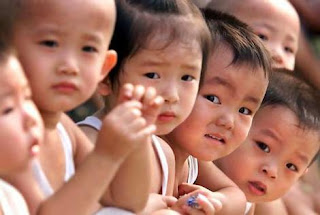
The Chief Principle
It is not outrageous to suggest that the family, the world over, is in crisis. One example of the family in crisis is the long term effect of divorce on children. India, a country traditionally with one of the lowest divorce rates in the world, is experiencing an increase in the number of divorces. There are families with one or two members who dominate emotionally or physically over the others, there are families which work for their own selfish benefits at the expense of outsiders, and there are families which focus on on the immediate fulfillment of each members desires thus sacrificing true happiness. Drug and alcohol abuse are also problems affecting hundreds of thousands of families worldwide. As a result of so many families failing to function correctly many alternative "institutional arrangements" for the upbringing of children have been attempted in many countries all over the world.
 |
| Foster Care is an example of an alternative arrangement for the raising of children. |
 |
| Boarding Schools are another example of an alternative to raising children. |
At this point it might be helpful to clarify a point which is often misunderstood: the difference between the nuclear family and the extended family. When a nuclear family is mentioned, it most commonly is referring to a mother, father and their children all living in the same household. Another word used to describe this type of family is the "immediate" family. The nuclear family is not necessarily cut off from the rest of its extended family and in many cases enjoys very strong healthy bonds with them. The extended family refers to the members of the family outside of the "nuclear" or "immediate" distinction. Thus some members of the extended family may live in the same house as the nuclear family, but this is not necessarily so. Members of the extended family in some cases live in several different countries all over the world A joint family, as we find in India with many generations living in close proximity to one another is one particular arrangement of an extended family.
There are many principles which should govern the interactions of family member and today we will discuss the one which is chief among them. This principle is the equality of men and women. To achieve this equality everywhere in the world and in all activities has been called "one of the greatest challenges of our times". It is in the family where we shape many of our attitudes towards greater society, and unfortunately where many of the inequalities which exist today against women get their start. In the first module of the Baha'i Academy's "Education in Universal Human Values" course our first practical exercise is to have the participants reflect on three instances of inequality in their own extended families and then create steps to help establish equality. Given below are some actual examples of inequality experienced by the Academy's participants, both students and teachers of other universities, and the according action which they felt would help improve equality.
"In my family, there is female infanticide. I would make them know about the value and importance of the female. I would also explain to them the laws against female infanticide and show some encouraging posters showing that males and females are equal."
"My Uncle and Aunt decided to stop my female cousin's studies and are forcing her to get married. I will talk with my aunt and make her understand that education is a must, and she should not force her (the cousin) to go against her wish."
"My father is not giving permission to my elder sister for teaching in school. I will convince my father to give permission to my elder sister. I will tell him that you are allowing me to become a doctor, then why are you not giving permission for her to become a teacher?"
"I'm not allowed to wear western dress whenever my grandparents or relatives are sitting together. I'll try to discuss with my parents that wearing any kind of dress doesn't make any difference in my thinking. My respect and behavior towards the family will be the same always. I'll also maintain my decency."
 |
| A metaphor commonly used to describe the equality of men and women is that they are like the two wings of a bird, both are necessary to create flight. |
"My uncle is very dominant, he just doesn't consider my Aunty's decision. I will have a family meeting. I will keep this point that we must consider each and everybody's decision and there must be gender equality."
"My uncle is ready to send his son for higher studies, but not the daughter. He thinks that the daughter gets married early and what is the need for educating her. I will show the problems in society which are occurring due to illiterate women. I will tell him that once one girl is educated, then she will be able to give her proper morals and education to her children. She will solve many problems by her own action."
"At the time of decision making, the male members are allowed to speak and the women are not allowed to give suggestions. I will explain to them that women are also intellectual and are able to make good decisions. Women can also offer some suggestions which may be better than men, so they should be given equal chance to speak."
The students then write up a report and we follow up with what the outcomes of the action were. It is in this way that we can learn together how to enact a change in our communities. In summary, the family is the basic foundation of society as this is the space where the majority of our attitudes and behaviors are formed before we bring them out into society. The family as an institution is in crisis due to the lack of principles to guide its relations. As a result of this crisis, many alternative arrangements have been created by society to raise its children. These alternatives cannot be a replacement for a child being raised in a family with both parents and contact with the extended family. The chief principle which must govern a families relationship is the equality of men and women.
Have you experienced or witnessed in your own life inequality between men and women? What are some of your experiences with working for equality? Please give your comments below.










Leave a Comment